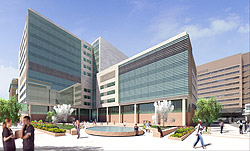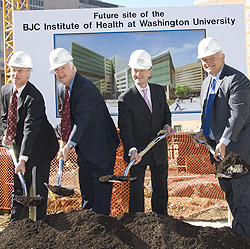The largest building ever constructed on the campus of Washington University School of Medicine in St. Louis will be the home base for BioMed 21 — the University’s innovative research initiative designed to speed scientific discovery and apply breakthroughs to patient care rapidly. The building is supported by a $30 million gift to Washington University’s medical school from BJC HealthCare and will be named the BJC Institute of Health at Washington University. (See related announcement.)
 |
|
Dean Larry Shapiro and two Interdisciplinary Research Center directors, David Holtzman and Jean Shaffer, discuss the importance of the new BJC Institute of Health at Washington University and the BioMed 21 research it will support.
|
Construction began in the summer of 2007 on the new building, which will house not only BioMed 21 laboratories and support facilities but also two academic departments of the School of Medicine as well as some support operations of Barnes-Jewish Hospital. The University will be adding 240,000 square feet of research space, and the estimated total cost of the building will be $235 million. As a hub for BioMed 21, the building will provide space for five newly created Interdisciplinary Research Centers (IRCs).
In other major developments exemplifying the progress of the BioMed 21 program, an $11 million, 16,000 square-foot, free-standing computing facility is being constructed to house the computing equipment needed to support the rapidly expanding research of the world-leading Genome Sequencing Center. (See related announcement.) In addition, 15,000 square feet of space are being added to the previously established Center for Genome Sciences to support 11 new investigators who will design and interpret genome-anchored clinical studies linking disease traits to human genetic makeup.
Launched in 2003, BioMed 21 creates a multidisciplinary- and translational-research imperative for basic scientists and clinician-researchers from many different medical disciplines. “We launched BioMed 21 because we recognized that effective collaboration among researchers in different fields is essential to the future of medicine,” says Larry J. Shapiro, M.D., executive vice chancellor for medical affairs and dean of the School of Medicine. “The initiative creates mechanisms to more quickly bring basic scientific knowledge to application for medical treatments. These expansions announced today are monumental and demonstrate the strength of our commitment to research that will revolutionize medical care.”

The BioMed 21 IRCs will occupy two floors and other School of Medicine facilities will occupy another three floors of the planned 11 floors in the nearly 700,000 square-foot BJC Institute of Health at Washington University. The new Institute is at the southwest corner of Euclid Avenue and Children’s Place, directly across the street from the McDonnell Pediatric Research Building, a joint project of the School of Medicine and St. Louis Children’s Hospital.
Located in the heart of the Washington University Medical Center Campus, the building will be in immediate proximity to the facilities in which Washington University Physicians provide patient care: Barnes-Jewish Hospital, St. Louis Children’s Hospital, the Center for Advanced Medicine and the Alvin J. Siteman Cancer Center.
The academic departments of the School of Medicine that will have laboratory space in the building are the Department of Pathology and Immunology, headed by Herbert W. “Skip” Virgin, M.D., Ph.D., the Edward Mallinckrodt Professor of Pathology, and the Department of Obstetrics and Gynecology, headed by George A. Macones, M.D., the Mitchell and Elaine Yanow Professor of Obstetrics and Gynecology.

The five IRCs selected to occupy the new building were chosen through a novel competitive application process that assessed the proposals’ scientific merit and alignment with the core principles of the BioMed 21 initiative. Each addresses a disease-specific area — cancer, cardiovascular disease, neurodegenerative diseases, infectious diseases or membrane excitability diseases — and each includes researchers from several scientific disciplines and academic departments, who proposed to work together in designated laboratory space within the new building. The IRCs will include established faculty members and will recruit additional new faculty members who possess specific expertise needed to fulfill their missions.
“It’s a tremendous opportunity — new ideas and inspiration can arise when researchers with different training and experience are able to interact closely on a daily basis,” Shapiro says. “The centers will allow them to better share information, resources and skills to achieve an advanced level of discovery pertinent to human disease.”
The IRCs are
- the Center for Cancer Genomics, led by Simon Powell, M.D., Ph.D., professor and head of radiation oncology;
- the Center for the Investigation of Membrane Excitability Disorders (CIMED), led by Jeanne Nerbonne, Ph.D., the Alumni Endowed Professor of Molecular Biology and Pharmacology, and Colin Nichols, Ph.D., the Carl F. Cori Professor;
- the center for Women’s Infectious Disease Research (cWIDR), led by Scott Hultgren, Ph.D., the Helen Lehbrink Stoever Professor of Molecular Microbiology, and Michael Caparon, Jr., Ph.D., professor of molecular microbiology;
- the Hope Center Program on Protein Folding and Neurodegeneration, led by Alison M. Goate, D. Phil., the Samuel and Mae S. Ludwig Chair in Psychiatry at Barnes-Jewish Hospital, and David Holtzman, M.D., the Andrew B. and Gretchen P. Jones Professor and head of Neurology; and
- the Center for Interdisciplinary Studies of Diabetic Cardiovascular Disease, led by Jean E. Schaffer, M.D., professor of medicine and of molecular biology and pharmacology, and Daniel S. Ory, M.D., associate professor of medicine and of cell biology and physiology.
The Center for Cancer Genomics will capitalize on the strength of genome sequencing at the School of Medicine and the research orientation of the Siteman Cancer Center. This IRC aims to find genetic variants that modify a person’s cancer risk and a person’s response to cancer therapies. It will also identify biological mechanisms and markers that will lead to improved cancer diagnoses and treatments.
The Center for Membrane Excitability Disorders will investigate the molecular, cellular and systemic mechanisms that underlie both inherited and acquired membrane excitability diseases, which include epilepsy, migraine, congenital cardiac dysfunction, neonatal diabetes and cystic fibrosis.
The center for Women’s Infectious Disease Research will focus on infectious conditions prevalent in women. Researchers will investigate the role of infectious agents — bacteria and viruses — in such medical issues as premature birth, bladder dysfunction, recurrent urinary tract infections, cancer, diabetes and heart disease.
The Hope Center Program on Protein Folding and Neurodegeneration will study problems that tend to affect the aging brain: Alzheimer’s disease, Parkinson’s disease, Huntington’s disease, front-temporal dementia and amyotrophic lateral sclerosis (ALS), among others. Such disorders appear to stem from aggregation of proteins that become misfolded, and researchers will seek a better understanding of this process.
The Center for Interdisciplinary Studies of Diabetic Cardiovascular Disease will address how the metabolic changes found in diabetes — alterations in the way sugars and fats are processed in the body — lead to heart disease, a significant complication of diabetes. Researchers will investigate methods for early diagnosis and effective treatment of heart disease in diabetes.
Building planners estimate that BioMed 21 researchers will occupy labs in the new building by December 2009. Cannon Design, an international architectural, engineering and planning firm, is the project architect and S. M. Wilson is the general contractor.
Washington University School of Medicine’s 2,100 employed and volunteer faculty physicians also are the medical staff of Barnes-Jewish and St. Louis Children’s hospitals. The School of Medicine is one of the leading medical research, teaching and patient care institutions in the nation, currently ranked fourth in the nation by U.S. News & World Report. Through its affiliations with Barnes-Jewish and St. Louis Children’s hospitals, the School of Medicine is linked to BJC HealthCare.
BJC HealthCare is one of the largest nonprofit health care organizations in the United States, delivering services to residents primarily in the greater St. Louis, southern Illinois and mid-Missouri regions. With net revenues of $2.9 billion, BJC serves urban, suburban and rural communities and includes 13 hospitals and other health service organizations. Services include inpatient and outpatient care, primary care, community health and wellness, workplace health, home health, community mental health, rehabilitation, long-term care and hospice.
Siteman Cancer Center is the only federally-designated Comprehensive Cancer Center within a 240-mile radius of St. Louis. Siteman Cancer Center is composed of the combined cancer research and treatment programs of Barnes-Jewish Hospital and Washington University School of Medicine. Siteman has satellite locations in West County and St. Peters, in addition to its full-service facility at Washington University Medical Center on South Kingshighway.